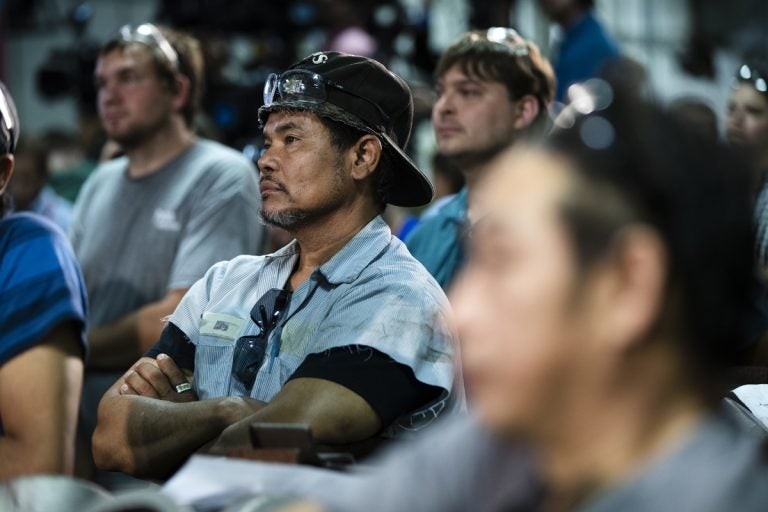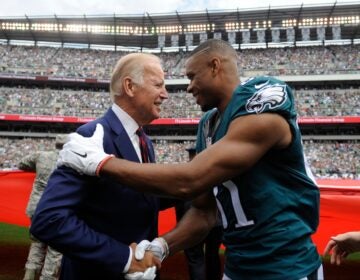It’s not just a bad tax bill
Why are Republicans so insistent on this legislation? Because the second part of their strategy is to reverse long-established policies that benefit the poor and middle-class.

Workers listen to Speaker of the House Paul Ryan, R-Wis., speak at the Pennsylvania Machine Works in Aston, Pa., Thursday, Sept. 28, 2017. The House and Senate have passed separate tax bills that must now be reconciled in committee. (AP Photo/Matt Rourke)
As the Republicans get closer to enacting their legislation, the truth about it is becoming evident. This is not just a tax bill. It is a plan to roll back the achievements of the New Deal and undermine the political power of working people and the middle class.
Incomes are becoming ever more unequal, but the Republican tax plan will make the rich richer and the poor and middle class poorer. Tax cuts in the Senate bill, which just passed on Saturday, are directed to big businesses — corporations and pass-through businesses — that are owned by the top 1 percent of income earners. Tax cuts for individuals will be minimal in the early years, and will expire by 2027. At that time households with income at or below $75,000 — which make up a bit more than 65 percent of all households — will, on average, see their taxes go up. But in that same year, 60.1 percent of households with incomes above $1 million will get a tax cut.
The Republicans say that tax cuts create economic growth. But reputable economic analysts, including the Joint Committee on Taxation, conclude that the benefits are vastly overstated. That tax cuts for business won’t spur much new investment should not be a surprise. Business profits are high, as are corporate savings, while interest rates are low. Businesses already have little trouble finding funds to make additional investments.
The real barrier to new investment is that most people cannot afford to buy more than they do. Large tax cuts for rich people who save much of what they earn won’t drive consumer spending. To spur investment we should be increasing wages for people who will spend their additional earnings. We need a higher minimum wage and investments in infrastructure and education that raise wages.
Effect on health insurance
So why are the Republicans so insistent on this legislation? Because the second part of their strategy is to reverse long-established policies that benefit working people and the middle class.
That’s already part of the bill. About 13 million Americans — 500,000 in Pennsylvania — will lose health insurance as a result of a repeal of the individual mandate, according to the Center for American Progress. That will lead to 1,000 to 2,000 premature deaths in our state alone. By 2027, most Pennsylvanians who purchase insurance on the individual market will see their insurance premiums go up more than their taxes are cut.
The legislation will also lead directly to a reduction of $400 billion in Medicare spending over 10 years, according to the nonpartisan Congressional Budget Office.
Expect more cuts against the poor
Over the longer term, the deficits created by the legislation will give Republicans a justification to reduce the spending that benefits most of us. Already Republican senators such as Marco Rubio and our Pat Toomey admit that the additional $1.5 billion in deficits created by the bill requires deep cuts to Medicaid, Medicare, and Social Security. In the debate on the tax plan, Sen. Orrin Hatch said that it is difficult to continue the CHIP program because “we don’t have money anymore.” A reduction of Medicare by $500 billion and Medicaid by $1 trillion is already allowed under the budget resolution Republicans supported this year.
Why do Republicans seek to drastically cut these programs? Partly because it makes even deeper tax cuts for their rich patrons possible. And this cycle of first cutting taxes on the rich and then benefits for the poor also strengthens the hold of the elite on our politics.
Concentrating power among wealthy
How could legislation so heavily weighted towards the top 1 percent and so harmful to most American families even get a hearing, let alone a majority in a democratically elected Congress?
The answer is frightening: Our democracy is already distorted in ways that give the rich too much sway over public policy. The Citizens United decision that allows the rich to make unlimited political contributions, the laws that suppress the vote of those with low incomes, and the gerrymandering of political districts all favor Republicans. Growing inequality itself gives the 1 percent additional resources to skew politics in their favor.
So this is not just a tax bill. It is part of a three-pronged strategy to shift income, wealth, and ultimately power from working people and the middle class to the corporate elite. This horrible legislation should shock the conscience of anyone who cares about supporting the vulnerable; who care for cares for equality of opportunity, who cares for the prosperity of working people and the middle class, and who cares for democracy itself.
WHYY is your source for fact-based, in-depth journalism and information. As a nonprofit organization, we rely on financial support from readers like you. Please give today.



